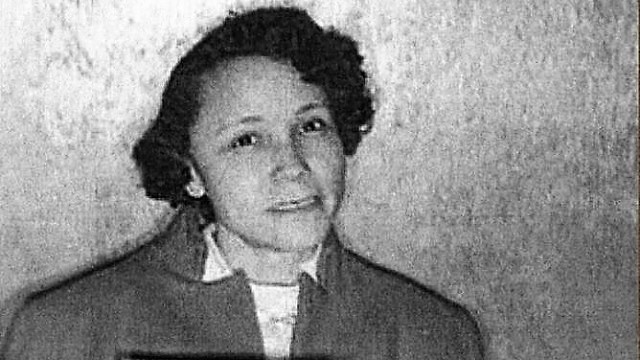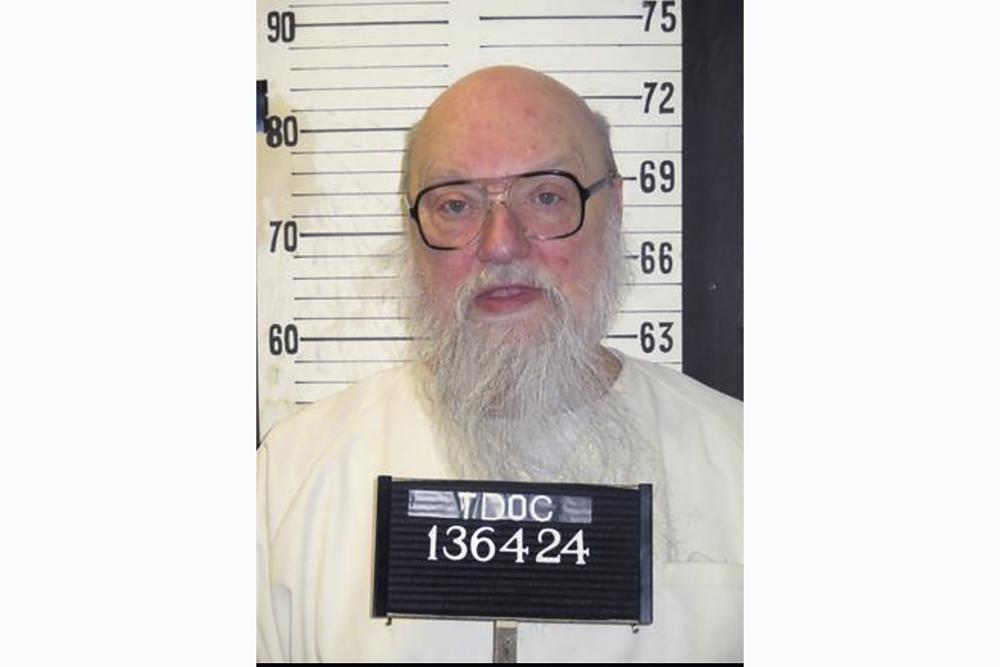Alabama State University renames residence hall for civil rights leader Jo Ann Robinson

Alabama State University is naming a residence hall after civil rights pioneer Jo Ann Robinson. Robinson played a key role in the historic 13-month Montgomery Bus Boycott in the mid-1950s, The Montgomery Advertiser reported. University officials named the building after her this week in Montgomery. The hall was previously named for Bibb Graves, former Alabama state governor and a member of the Ku Klux Klan. The Board of Trustees had voted to change the name in September. “She’s finally being brought to the forefront,” said Dr. Sheree Finley, one of Robinson’s relatives. At a ceremony this week on the campus, civil rights attorney Fred Gray recalled the times that he planned the bus boycott in Robinson’s living room. “Little did many know that (many of the) activities that (had an) impact on the civil rights movement in Alabama occurred at Jo Ann Robinson’s house,” Gray said. “She was the person who was interested in having mass participation,” Gray said after the ceremony. “We could have desegregated the buses without a protest, but she was interested in getting something done with the community.” Republished with the permission of the Associated Press.
Suit claims city trying to limit Confederate statue protests

An organization that has staged dozens of protests against a Confederate monument in north Alabama filed suit, contending the city of Florence is trying to limit the demonstrations in violation of free-speech guarantees. The lawsuit, filed Tuesday by Project Say Something and its founder, Camille Bennett, claims the city and Police Chief Ron Tyler are trying to clamp down on the protests by telling the group when, where, and how it can demonstrate against the monument, located at the Lauderdale County Courthouse. Bennett said the organization, a nonprofit she founded about eight years ago, has tried to work with the city, the TimesDaily reported. “Alabama has a long history of confronting racial injustice through peaceful demonstration, and it is imperative that we not lose that ability to speak truth to power when the situation demands it,” Bennett said in a statement. The city has not responded to the federal lawsuit in court, and city officials declined to comment. The courthouse monument was dedicated in 1903 when Confederate descendants were erecting memorials all over the South to honor rebel veterans and perpetuate the “lost cause” mythology that portrayed the Civil War as being about something other than slavery. Project Say Something began almost daily protests against the monument in 2020 following the police killing of George Floyd in Minneapolis. While the group held as many as 175 demonstrations in 2020, it cut back the following year because the city used its noise and parade permit ordinances to discourage them, the lawsuit said. The chief relocated the demonstrations to a “protest zone” away from the courthouse to shrink the potential audience, it claimed, and he threatened to issue citations. After the city requested $360 a day for police protection during demonstrations, the group began hiring private security and has spent about $4,100 so far, according to the complaint. The group held “silent” protests in response to noise complaints after counter-protesters began gathering and yelling racial epithets at demonstrators, it said. David Gespass, co-chairman of the Alabama chapter of the National Lawyers Guild, which was among the organizations assisting with the lawsuit, said it was not up to the city or Tyler to tell people “where and how to protest.” “The First Amendment holds that everywhere from the Atlantic to the Pacific and Canada to Mexico is a protest zone,” Gaspass said. Republished with the permission of the Associated Press.
Katie Britt, Mo Brooks challenge Mike Durant to debate in U.S. Senate race

U.S. Senate candidates Katie Britt and Rep. Mo Brooks this week challenged GOP primary rival Mike Durant to debate them ahead of next month’s primary. “I’ve agreed to multiple proposed debates between myself, Mike Durant, and Mo Brooks. Congressman Brooks, to his credit, has also agreed. Why won’t Mr. Durant?” Britt wrote on Twitter this week. Durant campaign adviser Scott Stone maintained Thursday afternoon that “Mike is not refusing to debate anyone.” In an email he added that “Mike is busy traveling the state, talking with voters building the wall, ensuring election integrity, and defending the 2nd Amendment. Like Coach [Tommy] Tuberville, Mike is focused on meeting with voters, not playing political games with career politicians.” The GOP primary in the conservative state will likely decide who succeeds GOP Sen. Richard Shelby, who is retiring. The three Republicans are considered frontrunners in next month’s GOP primary for the Senate seat being vacated by retiring Sen. Richard Shelby. Alabama Republican Party Chairman John Wahl said the party offered to host a Senate debate as a resource to GOP voters and to the candidates ahead of the May 24 primary. He said they had floated several possible dates to the campaigns. “Mo Brooks agreed to participate. Mike Durant could not work it out, and Katie Britt basically said if Mike Durant can’t make it, she was not interested,” Wahl said. Wahl said it is “unlikely at this point” that the debate will happen. Durant is a businessman best known as the helicopter pilot shot down and held prisoner in the 1993 “Black Hawk Down” incident. Britt is Shelby’s former chief of staff and the former head of a state business group. Brooks represents Alabama’s 5th Congressional District after first being elected in 2010. Brooks, who voted against certifying President Joe Biden’s election win, was initially endorsed by former President Donald Trump. Trump rescinded the endorsement last month. “There are multiple open-ended debate offers from groups throughout the state that are willing to be flexible to accommodate Mike Durant. If he actually was willing to debate, he would be willing to make one of those opportunities work,” Brooks campaign spokesman Will Hampson said Thursday. The Britt campaign echoed that sentiment and a spokesman said that they are “100% in for a three-person debate.” “No one knows what Mike Durant really believes, because he is hiding from debates, forums, the media, and questions from voters on the campaign trail … The only logical conclusion is that the character Mike Durant plays on TV doesn’t match the person he is in real life,” Sean Ross wrote in an emailed statement. It is not unusual for safe incumbents to refuse to debate, believing they have nothing to gain. but much to risk, by putting themselves on a debate stage. Shelby refused to debate a primary challenger in 2016, a decision Britt, as his then-campaign spokeswoman, defended by saying Shelby had a record that was already well known to state voters. Alabama Gov. Kay Ivey in 2018 did not debate primary challengers or Democratic challenger Walt Maddox. Steve Flowers, a political commentator, said this is different in that it is an open seat with no incumbent for the powerful office. He said Durant appears to be trying to “run out the clock” and run a race that depends mostly on television advertising. “I call him a phantom candidate,” said Flowers. Republished with the permission of the Associated Press.
Joe Biden announces heavy artillery, other weapons for Ukraine

President Joe Biden pledged an additional $1.3 billion Thursday for new weapons and economic assistance to help Ukraine in its strong but increasingly difficult battle against the Russian invasion, and he promised to seek much more from Congress to keep the guns, ammunition, and cash flowing. The latest military aid, Biden said, will be sent “directly to the front lines of freedom.” “Putin is banking on us losing interest,” Biden said. The Russian president is betting that “Western unity will crack … and once again we’re going to prove him wrong.” The new package includes $800 million in military aid for much-needed heavy artillery, 144,000 rounds of ammunition, and drones for the escalating battle in the Donbas region of eastern Ukraine. It builds on roughly $2.6 billion in military assistance that Biden previously approved. There’s also a fresh $500 million in direct economic assistance to Ukraine for government salaries, pensions, and other programs. That raises the total U.S. economic support to $1 billion since Russia’s invasion began nearly two months ago. Ukrainian President Volodymyr Zelenskyy expressed his gratitude to the United States in his nightly address in Ukraine, saying the military aid was “just what we were waiting for.” Earlier in a virtual address to the World Bank meeting in Washington, he said his nation will also need up to $7 billion each month to make up for economic losses. With tens of thousands of buildings damaged and key infrastructure in ruins, Ukraine “will need hundreds of billions of dollars to rebuild,” Zelenskyy said. Biden underscored a need for the United States and Western allies to remain resolved in their support for Ukraine amid signs that Americans may becoming more wary of the war. A poll published Thursday by The Associated Press-NORC Center for Public Affairs Research shows Americans’ desire to get involved has waned somewhat. Some 32% say the U.S. should have a major role in the conflict. That’s ticked down from 40% last month, though it’s slightly higher than the 26% who said so in February. An additional 49% say the U.S. should have a minor role. The president also announced that Russian-affiliated ships would be barred from U.S. ports, though that appeared to be largely symbolic. Russian ships bring a tiny amount of the cargo unloaded in the U.S., and “my guess is that … a decent chunk of that was tankers transporting Russian oil, which is now banned anyway,” said Colin Grabow, a research fellow who studies trade at the Cato Institute. Overall, Biden said that the $6.5 billion in security assistance that Congress approved last month as part of a $13.6 billion package for Ukraine could soon be “exhausted.” With the latest announcement, Biden has approved about $3.4 billion in military aid since Feb. 24. Congress’ overall total also included about $6.8 billion in direct economic assistance to care for refugees and provide economic aid to allies in the region impacted by the war — and additional funding for federal agencies to enforce economic sanctions against Russia and protect against cyber threats. “Next week, I’m going to have to be sending to Congress a supplemental budget request to keep weapons and ammunition deployed without interruption,” Biden said. Congress has signaled it is receptive to further requests and has been expecting there would be a need for further help for the Ukrainians. But the issue could become entwined with partisan fights over pandemic spending and immigration, complicating the pathway. Senate Minority Leader Mitch McConnell, R-Ky., has expressed a willingness to consider more aid for Ukraine in recent weeks. “I think we need to say we want the Ukrainians to win, and we’re prepared to do everything we can to help them win,” McConnell said Monday in Shelbyville, Kentucky. “We want to do more,” House Speaker Nancy Pelosi, D-Calif., told reporters at the Capitol during an appearance with Ukrainian Prime Minister Denys Shmyhal. She said lawmakers would learn more about Biden’s latest funding request “in the next day or so, to be taken up as soon as we can. Next week.” Biden has chosen retired Lt. Gen. Terry Wolff, a National Security Council official during the Obama administration, to oversee the coordination of the security assistance to Ukraine, according to a White House official. The official, who spoke on the condition of anonymity to discuss the yet to be formally announced the appointment, said Wolff was brought to the White House National Security Council team in recent days. Biden spoke on the new assistance and more broadly about the situation in Ukraine, hours after Russian President Vladimir Putin claimed victory in the strategic city of Mariupol. Putin, however, ordered his troops not to risk more losses by storming the last pocket of Ukrainian resistance in the war’s iconic battleground. Biden in an exchange with reporters following his remarks, called Russia’s claim on Mariupol “questionable.” Russian forces have destroyed much of the southeastern port city, which has witnessed some of the fiercest fighting of the war. By Russian estimates, about 2,000 Ukrainian forces remain holed up in a sprawling steel plant, even as Russia continues to pound the industrial site and issue ultimatums for surrender. Biden sought to make clear to Russians that plenty more military assistance for Ukraine would be coming. “Sometimes we will speak softly and carry a large Javelin because we’re sending a lot of those,” Biden said, paraphrasing Theodore Roosevelt and referring to an anti-tank missile system. The new U.S. military assistance is to include 72 155mm howitzers, 144,000 artillery rounds, 72 vehicles used to tow to the howitzers onto battlefields, and over 121 Phoenix Ghost tactical drones, as well as field equipment and spare parts. Pentagon press secretary John Kirby said the drones were developed by the Air Force and fit a specific need of Ukrainian forces in the battle for the Donbas. The drones are produced by a U.S. company, Aevex Aerospace, in a program that began before Russia invaded on February 24. Kirby said the Phoenix Ghost is similar to the armed Switchblade kamikaze drones that the Pentagon
Tennessee Gov. Bill Lee calls off execution, citing oversight in plan

Tennessee’s governor on Thursday called off what was to have been the state’s first execution since the start of the pandemic, granting a temporary reprieve to the oldest inmate on death row for what was called an “oversight” in preparations for the lethal injection. Republican Gov. Bill Lee didn’t elaborate on what issue forced the surprise 11th-hour stop to the planned execution of 72-year-old Oscar Smith. The inmate was to have received a three-drug injection only a short while later in the evening at a Nashville maximum-security prison. “Due to an oversight in preparation for lethal injection, the scheduled execution of Oscar Smith will not move forward tonight. I am granting a temporary reprieve while we address Tennessee Department of Correction protocol,” Lee said in a statement on Thursday evening. “Further details will be released when they are available.” Smith was convicted of the 1989 killings of his estranged wife and her teenage sons. Shortly before the governor’s surprise announcement, the U.S. Supreme Court had denied a last-hour bid by Smith’s attorneys seeking to block the execution plan. Dorinda Carter, a Department of Correction spokesperson, said the state Supreme Court would need to reschedule the execution. She said Smith would be removed from death watch and returned to his cell on death row. She declined to provide any more information and referred questions to the governor’s office. It was to have been Tennessee’s first execution since the start of the pandemic. In Houston, Texas’ oldest death row inmate was facing a scheduled execution Thursday evening. Carl Wayne Buntion, 78, was sentenced to death for the June 1990 fatal shooting of a Houston police officer, James Irby, during a traffic stop. In Tennessee, authorities had said earlier that the state was planning for five executions this year, including Smith’s. It has been seeking to resume its quick, pre-pandemic pace of putting inmates to death. The five pending death warrants tie Tennessee with Texas for the most nationally this year, according to the Washington-based nonprofit Death Penalty Information Center. Smith had initially been scheduled for a June 2020 execution, one of several dates delayed because of the pandemic. Smith was convicted of fatally stabbing and shooting Judith Smith and her sons Jason and Chad Burnett, 13 and 16, at their Nashville home on October 1, 1989. Smith has maintained he is innocent. In a clemency filing rejected Tuesday by Lee, Smith’s legal team claimed problems with the jury in his 1990 trial. His attorneys were earlier denied requests to reopen his case after a new type of DNA analysis found the DNA of an unknown person on one of the murder weapons. The state has not conducted any executions since February 2020, when Nicholas Sutton died in the electric chair for the killing of a fellow inmate in an east Tennessee prison. Of the seven inmates Tennessee has put to death since 2018 — when Tennessee ended an execution pause stretching back to 2009 — only two died by lethal injection. Smith had earlier declined to choose between the chair, and lethal injection, so lethal injection became the default method. Tennessee uses a three-drug series to put inmates to death: midazolam, a sedative to render the inmate unconscious; vecuronium bromide, to paralyze the inmate; and potassium chloride, to stop the heart. Officials have said midazolam renders an inmate unconscious and unable to feel pain. Expert witnesses for inmates, however, say the drugs would cause sensations of drowning, suffocation, and chemical burning while leaving inmates unable to move or call out. The assessment has led to more inmates selecting the electric chair over lethal injection. In Oklahoma last October, an inmate put to death using the same three-drug lethal injection convulsed and vomited after receiving midazolam. Oklahoma has carried out three lethal injections since, without similar reactions reported. Republished with the permission of the Associated Press.
Kentucky abortion law blocked in win for clinics

A federal judge on Thursday temporarily blocked a state law that effectively eliminated abortions in Kentucky after the state’s two remaining clinics said they couldn’t meet its requirements. The decision by U.S. District Judge Rebecca Grady Jennings was a victory for abortion rights advocates and a setback for the Republican-led legislature, which passed the law in March and then overrode Democratic Gov. Andy Beshear’s veto of the measure last week. Both of the clinics indicated Thursday that they would immediately resume abortion services. The new law bans abortions after 15 weeks of pregnancy and requires women to be examined by a doctor before receiving abortion pills. It also contains new restrictions and reporting requirements that the Kentucky clinics said they couldn’t immediately comply with. Noncompliance can result in stiff fines, felony penalties and revocation of physician and facility licenses. Jennings’ order did not delve into the larger issue of the new law’s constitutionality. Instead, it focused on the clinics’ claims that they’re unable to immediately comply with the measure because the state hasn’t yet set up clear guidelines. The judge said her order does not prevent the state from crafting regulations. Jennings, who was appointed by former President Donald Trump, said she decided to block the measure because she lacked information “to specifically determine which individual provisions and subsections are capable of compliance.” Abortion rights activists said they were relieved by the decision but noted more rounds are ahead in the legal fight. “This is a win, but it is only the first step,” said Rebecca Gibron, the CEO for Planned Parenthood in Kentucky, where its clinic is immediately resuming abortion services. “We’re prepared to fight for our patients’ right to basic health in court and to continue doing everything in our power in ensure abortion access is permanently secured in Kentucky.” Kentucky’s Republican attorney general, Daniel Cameron, signaled that he’ll be ready to defend the law as the case proceeds. “We are disappointed that the court chose to temporarily halt enforcement of the entire law,” he said in a statement. “This law is constitutional and we look forward to continuing to defend it.” Supporters say the goal of Kentucky’s new law is to protect women’s health and strengthen oversight. Opponents say the objective all along was to stop abortions in the state completely. Abortions had been suspended at the two Louisville clinics since the law took effect last week. During that time, women in Kentucky were forced to either travel out of state to end their pregnancies or wait for the judge’s decision. Many of the women affected were young and poor, advocates said. Attorneys for the two clinics — Planned Parenthood and EMW Women’s Surgical Center — filed separate lawsuits challenging the law and seeking an order halting its enforcement. Jennings issued the order in the Planned Parenthood suit. “Abortion remains legal and is once again available in Kentucky,” said Heather Gatnarek, a staff attorney for the American Civil Liberties Union of Kentucky, which filed the suit on behalf of EMW. “We will always fight to keep it that way here and across the country.” Kentucky is among several GOP-led states that have passed restrictive abortion laws in anticipation of a U.S. Supreme Court decision that could reverse the landmark Roe v. Wade decision that established a right to abortion nationwide nearly 50 years ago. Pending before the high court is a challenge to a law passed in a fifth state, Mississippi, that bans abortion after 15 weeks. The court has indicated that it will allow Mississippi’s ban to stand and conservative justices have suggested they support overruling Roe. The Mississippi case loomed even as abortion rights supporters cheered their victory Thursday in Kentucky. “Unfortunately, the ability to receive an abortion will continue to hang by a thread throughout the United States,” Gatnarek said. “In a few weeks, the Supreme Court will decide whether to weaken or overturn Roe v. Wade.” No matter how the current conservative-dominated Supreme Court handles pending high-profile abortion cases — perhaps weakening Roe, perhaps gutting it completely — there will be no monolithic, nationwide change. Fractious state-by-state battles over abortion access will continue. Republished with the permission of the Associated Press.

